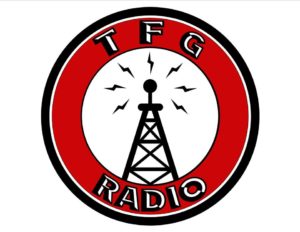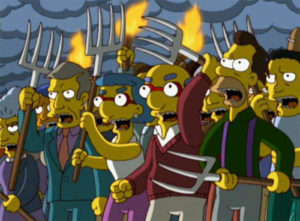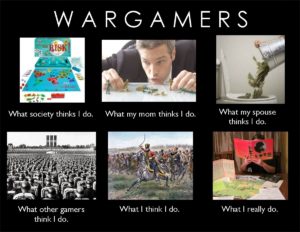Hey everyone! Adam, from TFG Radio, here to entertain and be disappointed in you at the same time!

Sorry, I missed my article last week. I was a little busy helping to judge a small tournament in Las Vegas. Maybe you heard pf it? It’s called the Las Vegas Open. Anyway, long story short, it was a lot of fun. I enjoyed the tournament, as a whole, and always enjoy meeting new people. I also enjoy meeting old friends that I have met throughout the years, as sometimes this is the only chance I get to see them. I enjoy judging and soaking in the spectacle that our game has become, although there is one thing that stood out to me that kind of bugged me. The mob mentality when it came to some players.
Throughout the course of the event, or any event really, there are some players that begin to be whispered about. People start to talk about them, in a negative light, and then people begin to get worked up because they begin to dislike that player. There are also times when you have players that already have a reputation before they event attend an event. Due to their past, a lot of people have already formed an opinion of that player before they set foot in the hall. People become very heightened around these players and begin to try to, essentially, get them in trouble so that they will either forfeit the game being played, or kicked out of the event. Although their hearts may be in the right place, this shouldn’t be something people are doing, that is the judge’s job. What you are dong is actually a detriment to the event, and will most likely annoy the judges, especially if the player hasn’t done anything wrong. or the judge is more informed than you are about what is going on. There are times where everyone just needs to chill and let things take their course.
I get it, player X, has been in trouble before. they may even be banned at other events. This is why we created the code of conduct, to help curtail these types of behavior. It’s not going to happen overnight, but you constantly badgering judges and taking their attention away from the players doesn’t really help. All it really does is annoy the judges and actually gives the players an excuse in that they are being harassed by people and they have done nothing wrong.** Yes, we know that a certain player, who has a history of cheating, is doing something shady. however it is still within the rules so we cannot do anything about it. Although legal, this still affects how people perceive them. Their actions is what the judges will look at and make decisions, especially since they are closer to the action than you.*** I’m not saying don’t be excited when a player you like happens to beat a player you don’t like, but please try not to get someone carded, or DQ’d, it may just backfire on you.

That’s all for this week, I hope you enjoyed the read. Let me know your thoughts, and stories from LVO, in the comments section. Don’t forget to visit our Facebook, Twitch, and Patreon pages to stay up to date on what we’re up to and when episodes drop!
And remember, Frontline Gaming sells gaming products at a discount, every day in their webcart!
*I’m not saying Y’all
**yet
***Unless it’s the NFC Championship Game





Ultimately it is up to each tournament whether they believe they have the time and patience to deal with the inevitable fallout from having players who by one means or another have earned a bad reputation. The LVO has made them welcome, the LGT has made it clear that they will close the door to players who would in future put an undue burden on the TO and judges.
It is no good getting annoyed at players attempting to stand up for their own rights in a situation where there is no valid reason to trust that their opponent is acting in good faith. This has been discussed a few times on the TFG podcast how players have to try to stand up for themselves. It is no good expecting or demanding that they to do this in the balanced manner of a judge, they are not there in the role of the judge you are.
I can see how this can get frustrating for judges but the alternative – denying players the right to try to stand up for themselves against opponents of poor reputation – is far worse and possibly toxic for the game.
Few things. First, Adam is the founder of TFG Radio and I am on it too. We definitely encourage the players in the game to advocate for themselves. What Adam is talking about in this article is the mob, not the player actively involved in the game, getting all riled up and distracting the judges. Distracting them with what is often erroneous, or even third hand, information. Nowhere in the article is he saying the player involved in the match should not stand up for themselves or call a judge, he was talking about the mob, the bystanders. As one of the most vocal proponents for self-advocacy in tournament 40k Adam would never make the assertion you’re claiming. I think you missed something.
Sure, stand up for yourself, but don’t go grabbing at straws or calling a judge every two minutes just because the guy you’re playing has a rep. Don’t be the boy who cried wolf.
Was there really a mob? Was there actually an unruly crowd rampaging around waving pitchforks and torches – or perhaps placards saying “down with this sort of thing”? Or is Adam indulging himself in exactly the same sort of over-reaction that he is accusing some of the players of having. As a judge should he not hold himself to a higher standard than that of the average player?
The story of the boy who cried wolf is rather different if we add in the fact that the players concerned have been witnessed on previous occasions behaving in ways that are not acceptable. Crying wolf after the sheep start disappearing to wolves is not the same story at all; it is a story of a shepherd boy who is nervous and feels under pressure with justifiable cause.
I recall during the pairings on sunday for the RTT (group 5 I think I was in) one guy was being vocal about someone… he was talking deliberately loudly about one of the players still playing in the LVO champ, like over the top, and also declaring “I don’t care what people think of me he is…” “what’s a judge going to do!?” and shortly after a judge pulling him aside to talk with him and deal with it.
It was a beautiful thing to see, because usually people like this just keep going and nothing stops them, he wasn’t even actively playing against that guy (or had to my knowledge) although I’ll admit I was doing my best to tune him out.
Maybe the “witch hunt” is how people express how much they don’t enjoy playing and dealing with toxic people?
Or maybe Toxic people enjoy starting witch hunts.
You know one thing that I repeatedly see that I don’t get is trying to defend the cheaters and keep them from being outed as cheaters. If you want the game to be taken seriously as a competitive game, then you need to take a harder stance against this. Sure a lifetime ban is ridiculous, but if the person is caught cheating at a top table, they should insta-lose or something and if it’s done repeatedly they need to be banned from events for some amount of time.
Virtually every single major 40k tournament since 8th dropped (ITC at least not sure about others) has had some sort of major drama at the top tables, cheating, slow play, being a douche to your opponent when you agreed to play loose, forfeiting on live stream without bothering to play because you lost initiative, etc.
At what point do you stop pretending that these are good people who had a “lapse in judgment” and protecting/standing up for them/even defending them?